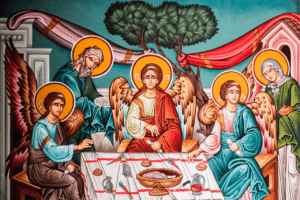Isaiah 22: 19-23 (RM) or Isaiah 51: 1-6; Psalm 138; Romans 11: 33-36 (RM) or Romans 12: 1-8 (RCL); Matthew 16: 13-20.
What’s in a name?
Maybe, a mistaken identity? An image from the past? A yearning for some way to hope for a better future? That’s about Jesus in this week’s Gospel.
And then there’s Peter. A pun in ancient Greek that nobody would pick up today unless you read ancient Greek? A job description? A commission? Or maybe, a certain dose of irony. (I’m thinking of a cartoon from many years ago that showed two disciples scowling and muttering behind their hand, “What was Jesus thinking, trying to build a church on rocky old Peter?”
As so often happens, there’s more going on here than meets the eye at a superficial reading, even when coupled with a handful of conventional commentaries purporting to explain what Jesus meant. And as always, we need to remember that the Gospels were written for late first-century Christians and reflect the challenges and fears they struggled with, in living this new, not-entirely-worked-out Christian faith.
The answers that the disciples gave when Jesus asked “Who do people say that I am?” all point toward a prophet. And some of them don’t make sense. Jesus and John the Baptist were contemporaries, unless people thought that Jesus somehow reincarnated John after the latter’s death. Their lifestyles and messages were completely different. And the prophet Jeremiah makes the cut because he represents a persecuted and suffering prophet, a way for Christians to make sense of a persecuted and suffering Messiah.
Peter, for once, said the absolute right thing by recognizing the divine origin of this prophet they knew as their friend Jesus. It was a stretch. But Peter’s words, as set down by Matthew, shift the meaning of the term Messiah from one of a militaristic, nationalistic conqueror, to an intimate family relationship. It was this insight that turned the key, pointing to the fact that the church, the ingathering of believers who lived out the message of Jesus, was to be characterized by humility, service, and mutual love.
But there’s something more in these two verses that lies under the surface of the Greek, something that makes sense for us today. In Aramaic the same word is used for “Peter” and “rock,” kêpā’, and the pun is obvious. But New Testament scholar Mitzi J. Smith points out the difference in the grammatical gender in Greek: “I say to you Peter (Petros) that on this rock (petra) I will build my church (ekklesia.)” Petra, rock, is grammatically feminine and agrees with ekklesia, church. So petra does not refer to Peter, but rather to the church, the assembly of baptized Christians. The church, the people of God called and gathered from all sides (ekklesia, from ek-kaleo, “those who have been called out”) is the rock. And the gates of hell shall not prevail against it.
The Gospels give us a number of stories implying that rocky old Peter was a highly unlikely candidate to serve as the human foundation of a worldwide faith community. But in this story he got something right: he managed to affirm that this Jesus of Nazareth was the Messiah, the Anointed One, the Promised One, not a military conqueror but as, to use the formulation in the Nicene Creed, One in Being with God. And that affirmation, and the life commitment it demands, does lay a solid foundation, a stable stone upon which faith communities and faith-filled individuals can build their lives, individual and collective.
© Susan K. Roll
This Reflection is partly based on the Reflection for August 23, 2020.
Susan Roll retired from the Faculty of Theology at Saint Paul University, Ottawa, in 2018, where she served as Director of the Sophia Research Centre. Her research and publications are centred in the fields of liturgy, sacraments, and feminist theology. She holds a Ph.D. from the Catholic University of Leuven (Louvain), Belgium, and has been involved with international academic societies in liturgy and theology, as well as university chaplaincy, Indigenous ministry and church reform projects.





I appreciated your exegesis of this text, and in particular the textual revelation that “petra does not refer to Peter, but rather to the assembly (ekklesia) of baptized Christians. The church, the people of God called and gathered from all sides … is the rock.